5月29日,南非将举行种族隔离制度结束以来的第七次大选,此前推动南非人民解放的「非洲人国民大会」(ANC,以下简称「非国大」)长期以压倒性优势胜选,但在今年的大选中,「非国大」预计将面临严峻的挑战。近日,大多数民调预测,「非国大」得票率将首次低于50%;曾任「非国大」南非总统的雅各布·祖马(Jacob Zuma)也选择支持「民族之矛」党派,与「非国大」竞争,给选举带来更多变数。
而在国际舞台上,作为全球南方国家的重要一员,南非也颇受关注。当地时间5月23日,海牙国际法庭就南非针对以色列的「种族灭绝」诉讼 做出了最新判决 ,要求以色列立即停止拉法攻势。尽管以色列政府24日发表声明反对南非和国际法院的做法,南非政府则表示国际法院的裁决「是重大突破」,将推动联合国安理会开展讨论,表示以色列必须遵守该裁决。
近日,在北京对话与联合国南方中心联合举办的「金砖国家货币和金融体系改革」对话会期间,参会的南非大使谢胜文与观察者网进行了一场对话,就中南关系的现状与发展前景,金砖合作成果,南非在巴以冲突的立场以及南非大选进行了深入讨论。
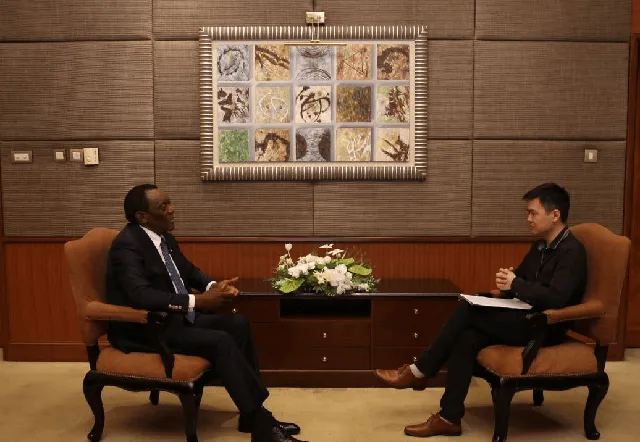
观察者网对话谢胜文(图源:北京对话)
中南两国关系进入到更高水平
观察者网: 您如何看待中国与南非关系的现状与发展前景?
谢胜文: 非常感谢。我非常荣幸能担任南非驻中华人民共和国大使,中南两国的关系是与我年轻的国家一同发展的。我们两国于1998年在南非人民获得自由后才建立外交关系,在这之前纳尔逊·曼德拉刚当选总统,南非的种族隔离政策刚结束,我们随即承认中华人民共和国是中国人民的唯一合法政府,并结束了与台湾的关系。1998年前南非在台湾和香港设有外交机构,而香港在当时已经回归中国了。
实际上,在两国建立外交关系前,我们的政治关系早已建立。在南非反对殖民主义和种族隔离的斗争中,中国在最困难的时期给予了我们支持。20世纪50年代,曼德拉的朋友沃尔特·西苏鲁(Walter Sisulu)被派来到这里会见中国领导人,请求中国支持南方人民争取自由的斗争,毛主席等中国领导层毫不犹豫地同意并提供了支持。60年代初,南非的一些自由战士还在中国军事学院接受了培训。

1977年,中国人民解放军南京军区军政干部学校的南非等地学员
因此,这是长期建立的信任关系,政治互信对于两国关系是非常重要的。现在,在习近平主席和西里尔·拉马福萨总统的领导下,我们正在将双边关系提升到更高的水平。
习近平主席去年对南非成功进行了国事访问,将两国关系提升到了更高的水平。首先,我们将南非的经济重建与复兴计划与中国的「一带一路」倡议结合起来,因为这些倡议是互通的。两国元首还将我们的政治互信关系形容为兄弟和同志之间的关系,这表明我们的领导人和我们的政治组织之间有着高度互信。因此,我们的政治关系是牢固的。
我们的经济关系正在加强,我们现在也在重视民间交流。举个经济方面的例子,当我们于1998年1月1日建交并在北京开设使馆时,南非和中国之间的贸易额约为10亿美元;25年间,这一数额增长到了560多亿美元。从10亿美元到560亿美元,这是个巨大的增幅。
在投资方面也是如此,南非公司在中国投资,中国公司也在南非投资,我们的投资是互惠互利、相辅相成的。自2009年以来,中国一直是南非最大的贸易伙伴;自2010年以来,南非一直是中国在非洲大陆最大的贸易伙伴,这表明了我们之间经济关系的实力。
去年,中国贸易部长王文涛和南非贸工部长帕特尔举行了会晤,今年3月他们又在北京举行了会晤。为了平衡两国贸易,中国同意从南非进口更多高附加值产品,两国政府和国家元首在这个问题上达成了一致。我们非常高兴的是,去年南非副总统马沙蒂莱在北京与中国国家副主席韩正会面,讨论中南国家双边委员会的工作,评估我们的工作进展。马沙蒂莱还参观了上海世博会,大约有四十家南非公司在上海世博会上展示了他们的高附加值产品。日后,我们将继续这项工作。
现在,我们两国之间的关键是在新数字经济、经济现代化以及应对气候变化等全球挑战方面相互帮助合作。可喜的是,我们在这方面的工作进展非常顺利。
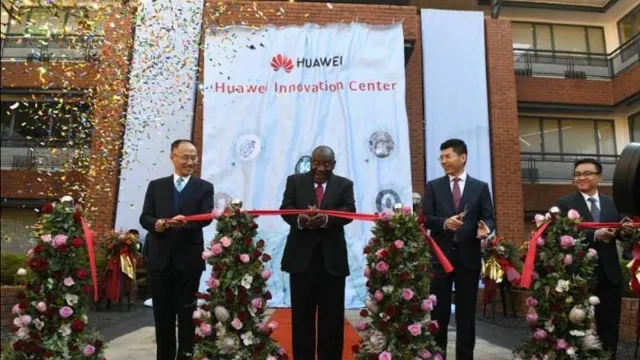
2023年7月13日,拉马福萨出席华为南非创新中心剪彩仪式(图源:华为)
因此,中南两国关系的各个方面都在不断加强,包括有许多南非学生在中国学习。两国在卫生、科技领域的合作也在不断加强,南非是新冠疫情后中国开放出境团队游的首批国家之一,南非总统将促进中国游客来南非旅游列为头等大事。因此,中南两国政府、公司和人民之间未来只会有更多的双赢合作。这就是我们每天为推动双边关系所做的事情,我们从未停下步伐,将继续把这种关系推向更高的水平。正因如此,即使在非洲大陆其他国家,我们也能一同开展联合项目,协助非洲一体化和推动非洲和平事业。我们正在与中国合作,中国国家主席习近平和南非拉马福萨总统在南非金砖国家峰会期间会见了非洲国家领导人,详细讨论了这些问题。
阻碍非洲国家发展的关键因素之一是其农产品的准入,因为他们没有科学家来认证其食品的安全性。去年11月,正如习近平主席所承诺的,中国在南方的海南省召开会议(观察者网注:期间中方正式发布了农业农村部落实【我国助力非洲农业现代化计划】务实合作举措(2024-2026)、中非农业科技创新联盟倡议、多年生稻创制及应用等三项成果),这表明中国领导人说到做到,他们不会只给出虚假的承诺。因此,我们可以看到,在经济、人文以及政治等各个领域,两国关系正变得越来越紧密。
金砖国家体系不同于以往的国际体系
观察者网: 金砖国家无疑是这一关系的关键要素之一。今年,全世界关注的焦点是俄罗斯的金砖峰会。那么,您认为俄罗斯将如何继承去年南非金砖峰会的精神?您本人在其中做了什么样的工作?
谢胜文: 去年,我们排除万难,成功举办了金砖国家峰会;当时有些人认为金砖五国会土崩瓦解,或者无法举行会议,毕竟这是新冠疫情后金砖五国领导人的首次会晤,且在俄罗斯受到制裁和俄罗斯总统受到外部压力之后举行的。但峰会成功了,因为金砖国家有共同的愿景。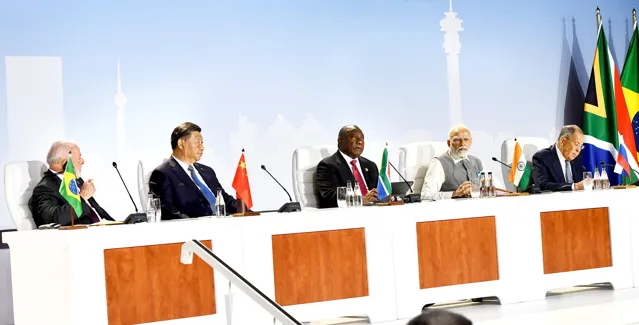
2023年南非金砖领导人峰会现场
我们虽然是不同的国家,有着不同的制度,但我们有着非常关键和重要的共识。我们认为,全球治理体系需要改革,以反映当前的现状。我们还坚信,必须改革国际金融体系,以反映当前的贸易现状,而不只是反映二战后的状况,因为80年间已经发生了很多变化。因此,尽管我们的体制不同,但这些共识将我们团结在一起。
作为金砖国家,我们不通过投票来做决定,而是通过协商一致来做决定。我们的领导人总会想方设法达成共识,大家可能认为这很耗时间,但在有政治互信的情况下,达成共识并不需要多少时间。举个例子,去年全球南方发展中国家要求加入金砖国家的呼声很大,但我们当时还没有最终确定如何接纳新的国家,没有最终确定准入标准,因为我们不想分裂全球南方国家。
但我们的领导人达成了共识,然后邀请了六个国家,根据它们自己的愿意可以在今年年初加入,毕竟加入的申请是它们自己提出的。这都是通过共识达成的,而在有政治互信的情况下,达成共识是很容易的,而人们总是很容易坚持自己所同意的事情。
我们不强调分歧,只强调能团结金砖国家的事情,而正是这一点给广大发展中国家留下深刻印象,也是有这么多国家申请加入的原因。去年有超过25个国家表示有兴趣,我相信随着今年轮值主席国来到俄罗斯,还会有更多国家表示有兴趣。因为现实情况是,全球南方国家正面临着各种挑战,他们在金砖国家体系中看到了一些积极的因素。我们成立的金砖国家新开发银行将有助于发展基建,当我们遇到像新冠疫情这样的冲击时,金砖国家都能够从应急储备中提取资金。发展中国家可以看到,我们正在利用自己的融资工具建设基础设施,而这种融资工具并不像当前的国际金融体系那样附带如此巨大和限制性的条件。
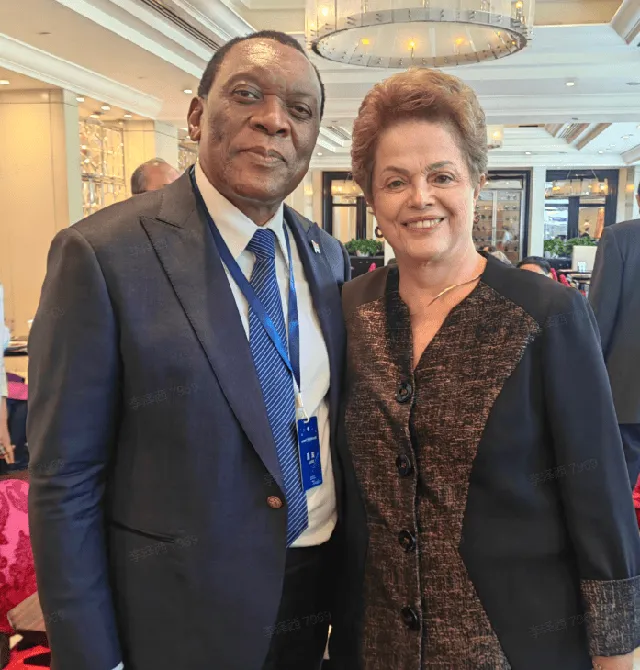
5月20日「金砖国家货币和金融体系改革」对话会期间,谢胜文与新开发银行行长迪尔玛·罗塞夫合影
正因如此,俄罗斯将国际货币和金融体系改革作为优先事项,以使其反映当前的现状,我们对此表示支持。但是,我们认为这一切都必须透明,而且必须支持发展中国家的发展和贸易。这只是唯一的前提条件,但我们已经达成了普遍共识。有一个工作组正在研究国际货币和金融体系改革,我们相信,他们将向我们的领导人提交一份可行的报告,然后将在今年的俄罗斯金砖首脑峰会上通过。
南非向国际法庭状告以色列,不是因为宗教问题
观察者网: 全球南方国家特别关注的另一件事是加沙冲突。南非已在海牙对以色列提起诉讼,指控他们施行种族灭绝。有些国家感到惊讶,此案是南非而非穆斯林国家主导推动的。南非为何采取如此坚决的立场?您对西方国家反对南非的立场有何看法?
谢胜文: 首先,我们没有从宗教的视角看待加沙冲突,而是认为以色列的行径是公然无视国际法。我们的态度非常明确,甚至在我们将以色列政府告上法庭之前,我们就已经与以方进行了交涉。我们告诉以方,我们认为你们的所作所为是在实施种族灭绝;我们反对哈马斯的所作所为,即攻击你们的公民、劫持人质以及杀人。
我们仍然坚信两国方案,认为这是巴以彼此共存的最可行的解决方案。我们的原则是,反对滥杀无辜和集体惩罚。如果以色列想打击哈马斯,就不要去杀害无辜平民,不要杀害儿童和妇女,不要毁医院,不要摧毁支持巴勒斯坦人民的经济基础设施。这对我们来说一直是个原则问题,我们认为,对以色列这样一个经历过种族灭绝历史的国家说,他们应该对此更加敏感。
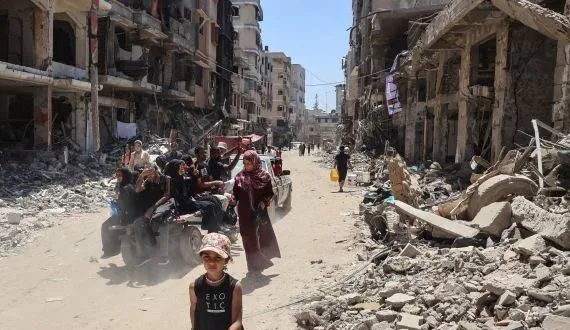
加沙地带的巴勒斯坦难民(图源:半岛电视台)
我们做出这一决定是出于原则,我们将继续站在弱者一边。我们知道这个决定不会得到某些大国的支持。但对我们来说,如果我们必须为此承担后果,那我们愿意坦然承担后果。但我们不能保持沉默,因为我们知道被攻击的痛苦。要知道,即使联合国也花了相当长的时间才将种族隔离定义为反人类罪。但是,正是通过全世界所有热爱和平的人们的共同努力,才将种族隔离定义为反人类罪。这样一来,他们就可以成功动员国际社会的支持。
所以,我们在这方面是有经验的。以色列不分青红皂白地杀害巴勒斯坦人民,只因哈马斯袭击了你们的一些基地,这就是反人类罪,因为以色列在试图消灭这些巴勒斯坦人民,消灭任何生活在加沙地带的巴勒斯坦人。这是不对的。这就是我们的立场。
但他们没有将我们的看法听进去。对我们来说,国际团结问题是我们建立当前民主制度的基石原则。曼德拉曾说,只要巴勒斯坦人民没有获得自由,我们的自由就不完整,因为我们知道被压迫的滋味。如果你是压迫者,就很容易忘记压迫别人的经历。但如果你是受压迫者,就很难忘记。我们甚至可以原谅那些压迫我们的人,但我们会挺身而出,反对种族主义的邪恶面目,反对公然践踏受国际法保障的人权。是的,我们确实收到了某些大国对我们贸易的威胁(观察者网注:美国议员等人曾多次威胁,取消南非因美国【非洲增长和机会法案】而享有的免关税优惠待遇),我们已经计算过损失,但我们告诉他们,如果你们要来欺负我们,威胁说要撤销与我们的贸易,那你们就动手吧。我们有过多年吃苦的经历,我们会找到办法的。幸运的是,他们没有采取这一步,但应该停止这种霸道的做法。
我们很高兴国际社会发出了巨大的呼声:解决冲突的唯一途径是对话。应该停止对加沙人民的狂轰滥炸,停止对无辜人民、儿童、妇女的杀戮,停止他们现在面临的饥荒。这就是我们将此事提交国际法庭的原因。
我们很高兴国际法庭在听我们的声音,我们仍在陈述立场。我们也很高兴不仅是阿拉伯国家,越来越多的国家都看到了这一点,因为这不是宗教问题,而是关乎如何处理国际法的问题。以色列是这一国际法体系的一员,南非也是其中一员。这个体系规定,如果其中一员像以色列这么做,各国有义务汇报,可以把他们告上法庭。
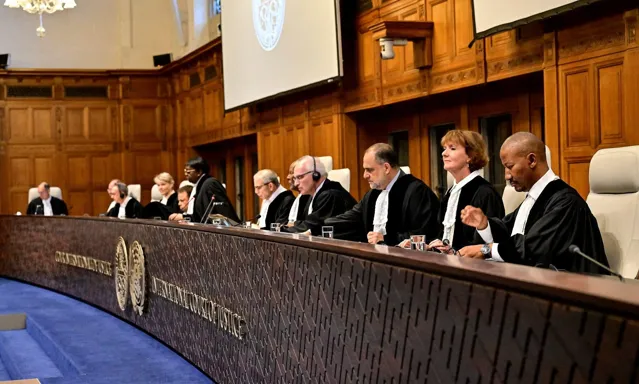
海牙国际法庭23日勒令以色列停止拉法攻势(图源:耶路撒冷时报)
现在我们面临的挑战是,在他们看来,我们是在攻击以色列,但这实际上是为了维护联合国体系。联合国体系是我们在全球范围内唯一可行的系统,我们不能让它崩溃。第一个联合国体系是「国际联盟」(观察者网注:一战和二战期间的联合国前身机构,因重要国家的缺席,以及轴心国等国无视其规章制度侵略他国,未能避免战争,二战期间崩溃),我们知道它是如何崩溃的:当大国保护他们的朋友,允许他们在他国为所欲为或施行种族灭绝时,就导致了上一个联合国体系的崩溃。我们不会允许当前的联合国体系崩溃。
南非超过342年的殖民历史问题,不可能在30年内得到彻底解决
观察者网: 就即将到来的南非大选,民调显示,「非国大」的得票率很可能首次低于50%;与此同时,前总统祖马则在跟非国大唱「对台戏」。您如何看待这次选举,您认为国际社会应该如何看待这次选举?
谢胜文: 南非已经建立了能够支持民主制度的原则和机构,我们相信我们的法律体系和独立选举委员会将在5月29日顺利举行选举,并实现和平过渡。我们所有的选举都是和平的,尽管国际社会时常对此持有悲观态度。上周末,我们刚刚在使馆进行了投票,包括在北京、香港和上海。在过去三次选举中,所有的预测都认为现执政党的支持率将低于50%。幸运的是,这些民调之前都错了,我不知道这是不是因为发起这些民调的人都对「非国大」持批判态度。我们这次仍然认为他们是错的。但无论发生什么,选举结果都将由选民决定,选民们将在29日发出自己的声音。
我们仍然相信会有政治延续性,因为「非国大」一直是南非稳定的支柱。国际社会,非洲兄弟都对此有担忧。但我们向他们保证,我们所建立的制度是透明的,是足够强大的,选民将做出他们的决定。
关于前总统祖马的问题,他仍然是「非国大」的党员,但目前党员资格已被冻结。他支持另一个政党(「民族之矛」)或领导另一个政党对执政党来说,并不是一件好事。但我认为「民族之矛」的支持率还没有大到让其扮演重要角色的程度,目前所谓的民意调查预测该党支持率约为8%,我们不知道它到底会得到多少选票。
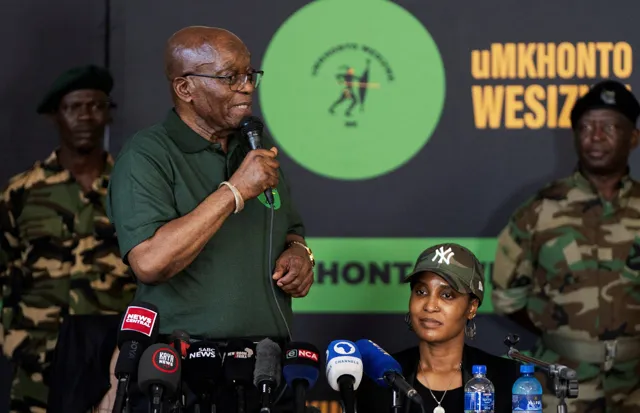
2023年12月16日,前总统祖马出席「民族之矛」党竞选活动,宣布不再支持「非国大」(图源:路透社)
但我们相信,「非国大」目前带来的当前和长期稳定性以及竞选宣言,会让很多人相信,政治连续性是非常重要的,因为我们是一个年轻的国家。我们从来没有认为,我们因超过342年的殖民主义、种族隔离而面临的挑战能在30年内得到彻底解决,但我们已经取得了进展。我们的政府提供了基本服务,将南非从一个分裂的国家转变为一个团结的国家,这些都是在短短几年内取得的重大成就。
我们相信,我们将继续推进这些议程,甚至在选举之后以更快的速度推进这些议程,这样我们不仅在国内,还在国际上继续发挥我们的作用,与像中国这样的国家一同推动和平发展、和平共处以及各国之间的合作与团结。
以下为英文原文:
Guancha: How would you assess the present state and future potential of the China South Africa relationship?
Ambassador Cwele: Thank you very much. As the South African ambassador to the People's Republic of China, it’s really been a privilege for me, because our relations matches our young country. We only established the diplomatic relations in 1998 after our freedom. Because it's only after our freedom that President Nelson Mandela changed the apartheid policy and recognized People's Republic of China as the sole representative of Chinese people. So we move away from the relations with Taiwan. It was on Taiwan and Hong Kong, and then Hong Kong was reincorporated.
So when we established these relations, the fundamental thing was that our political relations were long established. China supported us during the most difficult part of our struggles against colonialism and Apartheid. In the 1950s, Nelson Mandela's friend Walter Sisulu came here, sent to meet the leadership of China, asking for support for struggle for freedom. And Chairman Mao and the leadership of China never hesitated to offer this support. They actually went on to train some of our freedom fighters on military colleges in the beginning of the 60s.
So that has been the long established relationships of trust, political trust is very important. Now under President Xi Jinping and President Cyril Ramaphosa, we are taking this relationship to even higher levels. What makes it even more, is that President Xi had a successful state visit last year, which took these relations to even higher level, where they said let's align our key programs for better implementation of our strategic comprehensive partnership. First, we align the South African economic and reconstruction and recovery program, as well as the Chinese Belt and Road Initiative, because these talk to each other. And thirdly, they described our relationship of political trust as a relationship of brothers and comrades, which show the high level of trust between our leaders and our leading political organization. So our political relations are solid.
Our economic relations are strengthening. And now we're focusing on people to people exchanges. Just to put the economic ones, for instance, into perspective, when we established the relations in 1998 on January 1st, opened the office in Beijing, the trade between South Africa and China was about 1 billion US dollars. In 25 years it grew to over 56 billion dollars. That's massive, from 1 to 56. And the investment part as well, South African companies are investing here, Chinese companies are also investing in South Africa. And there's a complementarity about this volume of investment. Now China is one of the large investment partners in South Africa. China has been the largest trading partner of South Africa since 2009. And South Africa is the largest trading partner from the African continent of China since 2010, which shows the strength of our economic ties and relations.However, last year, your trade minister Wang and my trade minister Patel met, and they met again this year in March in Beijing, where there is a common agreement that we have to balance our trade. In order to balance the trade we agree that we should bring more value added products from South Africa, there's agreement between our government and our president on this matter. And we're very happy that last year when our vice president met your vice president here in Beijing to do binational commission, assessing our progress of work, he also visited Shanghai Expo and we had about forty South African companies which just display their value added products in the Shanghai expo. And we continue this work. The key element, basically between us now is how do we work with each other to help each other in terms of new digital economy, modernization of our economy and also coping with global challenges like climate change. We are working very well on this.
So we can see growing strength in all aspects of our relations. We're very happy that there are many South African students who are studying in China. The cooperation on health, the cooperation on science and technology is getting stronger. We're very happy that South Africa is among the first countries where post covid China open for group tourism, because to us, Chinese tourists coming South Africa is a top priority of my president.So these are the things we only see that there will be more win-win cooperation between our people, our governments and our companies in this respect. And that's what we do on a daily basis to keep this relationship going, and we never get tired, we continue to take it higher to higher levels. And that's why we’re able, even on the continent, to agree to work on joint projects to assist the integration of Africa, the peace in Africa, we’re working with China. Your President Xi Jinping, and my President Ramaphosa met with African leaders at the sidelines of the BRICS summit in South Africa, where these matters were discussed in detail. In November last year, as President Xi promised, one of the key elements which was stifling the African countries was the access of their agriculture products, because they didn't have scientists to certify safety of their food. President Xi Jinping promised to offer training, called a meeting in Hainan province in the south in November, we show that what our leader say, it's done. They don't just give false promises. So we can see this relationship getting stronger and stronger from all elements, from economic, to people to people and the political.
Guancha: BRICS is definitely one of the key elements of the relationship. This year, what the world's attention is focused on is Russia's BRICS Summit. So how do you think it will inherit the message or the spirit of South Africa's BRICS Summit last year. And what has been your role in fostering this?Ambassador Cwele: Thank you very much. We had a very successful BRICS summit, against all odds last year. Some people thought the BRICS was going to collapse, not going to meet. It was a first meeting of leaders post covid. It happened just after the sanctioning of Russia and pressure on the Russian president. But the summit succeeded, because we got common vision as BRICS countries.
We are different countries, with different system, but what binds us is very key and very important. We believe that the global governance system needs to be reformed and represent the current reality. We also strongly believe that the international and global financial systems must be reformed to reflect the current realities of trade and not just post World War situation, because a lot has changed since then. So these are things, much as we've got different system, which bind us together. As BRICS, we don't take decision by voting, we take decisions by consensus. Our leaders always find ways to reach consensus. People think that this takes time; consensus doesn't take time when there's political trust. As an example, last year, we have not finalized how we will admit new countries, but there was so much pressure from developing south to join BRICS. And we have not finalized the criteria because one of the criteria is we should not divide countries of the Global South. But our leader they found consensus, and then invited six countries, that they can join at the beginning of this year if they wish, as they are countries that have applied. So it is through consensus and consensus can be reached easily when there's political trust, and you stick to the thing you agree upon.
We do not emphasize things which would create differences. We emphasize things where we unite as BRICS countries, and that's what has impressed most developing countries. That's why there are so many applicants, I want to join. Over 25 countries expressed interest last year, and I'm sure there will be more countries expressing interest as we go to Russia.Because the reality is that countries of the Global South are facing certain challenges, and they see some good elements within the BRICS system, they've seen that even the BRICS bank we formed, it helps us to develop our own infrastructure, it helps us with the contingency reserve when we have shocks like Covid, we're all able to draw from those contingency reserves as BRICS countries, and they can see the infrastructure we're building using our own financing instrument, which doesn't come with such huge and constraining conditionalities like the current international financial system. It is in this respect that the Russian Federation has prioritized international monetary and financial system reform to reflect the current realities. And we support them on this. However, we say that all this must be transparent and so that it must also support the development and trade of the developing countries. That's only proviso, but there's a general consensus. There's a task team which is working on this system. And we are confident that they will produce a workable report to our leaders to adopt at the Russian summit later this year.
Guancha: Something else that Global South countries have particularly paid great attention to is the war in Gaza. South Africa has filed a suit against Israel in the Hague, accusing them of genocide. This has surprised some countries that it's South Africa leading this and not a Muslim country. So why is South Africa taking such a strong stance? And what do you think of the western opposition to your stance?Ambassador Cwele: Firstly, we don't see the war in Gaza as a religious war. We see it as basically blatant ignoring of international law. And because we have been very clear, we have been engaging the Israeli government even before we took them to court. We told them that what you're doing, we think you're committing genocide. We don't agree with Hamas, what they did, attacking your citizen, taking hostage, or killing people. We still believe very strongly in the two state solution, and we think this is the most viable solution for you to live side by side with each other. And as a matter of principle, we are against indiscriminate or collective punishment. If you want to fight Hamas, you don't go and kill innocent civilians. You don't go kill children and women. You don't destroy hospitals. You don't go and destroy the economic infrastructure, which is supporting the people of Palestine. That has been the matter of principle to us. And we're saying to a country like Israel, which has a history of experiencing genocide, they should even more sensitive to this.
But we're not heard. To us, the issue of international solidarity is the principle under which our democracy was founded. To remember Nelson Mandela, he said we will never be free until people of Palestine are free, because we know what it’s like to be oppressed. If you’re an oppressor, it is easy to forget. But if you’re on the receiving end it’s difficult to forget. We can forgive even those who oppress us, but we would stand up to the evil head of racism, blatant abuse of human rights, which are guaranteed by international law, we will stand up.And we took this decision as a method of principle. And we'll continue to stand by the side of those who are weak, because we knew this decision was not gonna go well with some of the big powers for instance. But to us, we said, if we have to suffer the consequences, we will suffer those consequences. But you cannot keep quiet because we know the pain of being attacked. You know, it took time even for UN to define apartheid as a crime against humanity. But it was through united effort of all peace loving people in the world who describe apartheid as a crime against humanity. In that way, they could mobilize international support. So we've got experience on these things. Indiscriminate killing of the people of Palestine, just because Hamas has attacked some of your bases, it's a crime against humanity, because they are trying to eliminate these Palestinian people. They are trying to eliminate any Palestinian who live in that Gaza strip. That’s wrong. So that's what we stand for.
Yes, we did receive some threats from some of the big countries with our trade, we have calculated the losses, we told them, if you’re gonna come and bully us with the threat that you’ll withdraw your trade with us, you might as well do it. We know how to suffer, but we'll find a way. But luckily, they didn't go to such extent. But the bullying tactics and the bullying politics should stop. And we’re really happy that the international community is really making a huge call, that the only way to solve conflict is through dialogue. We should stop that indiscriminate bombing of the people of Gaza. We should stop the killing of innocent people, children, women, the famine they're facing now. That's why we took this to the international court. We are happy that they’re listening to us. We’re still pushing and presenting our case. We’re happy that more and more countries are seeing this, not only Arab, because it's not a religious thing, is a matter of how do we deal with international law. Israel is a member of this international law system. South Africa is a member. And that system says, if one of your member does this, you must report, you can take them to this court.
Now, the challenges is they see this thing as if we are attacking Israel, but it is also to protect our UN system, because that's the only viable system we have globally, the UN system. We cannot allow it to collapse. The first UN system is called league of nation, and we know how it collapsed: It is when big powers were protecting their friends and allowing them to do wrong things or genocide elsewhere, that it caused the previous UN system to collapse, and we're not gonna allow this current of UN system to collapse.
Guancha: On the upcoming South African elections. Polls show your party, ANC, is likely going to be fall below 50% for the first time, and your former President Zuma is playing a counter-productive role in this, from your party’s perspective. What do you think about this election and how do you think the international community should look at this?Ambassador Cwele: South Africa has established the principles and institutions that support our democratic system. And we are very confident on this, that these systems, both our legal system and Independent Electoral Commission, will conduct this election on the 29th of may and create a peaceful transition. All our elections have been peaceful despite the gloom the international community thought it was. We just voted this weekend at our embassies abroad, including here in Beijing, Hong Kong and Shanghai, they were always smooth and we believe the 29th will also be smooth.
On the issue of prediction, over the last three elections, all the predictions were that the current ruling party will go below 50%. And that has not happened, fortunately, all these polls, I don't know, because they're done by critical people, they were all wrong. We still believe they are wrong. But whatever happens, the outcomes of the elections are determined by the voters. It is the voters who gonna make their voice heard on the 29th. And we still believe that there will be some form of continuity, because ANC has been the anchor of stability in South Africa. It's not only a fear of international communities, a fear also of African brothers, because they also have this feeling. But we assure them that with the systems we’ve built, they're transparent, they're strong enough, and the voters will make their decisions.
On the issue of the former president, who is still a member of the ANC, but suspended at that moment, supporting another party or leading another party is not a good thing for the ruling party. But I don't think his support is so big that it may make him as a significant player. The current projected supported by so called polls is about 8%, but we don't know how much he will get. But we believe that the current stability brought by the leading party, and the projected stability, because look at the manifesto, it will convince many people that continuity is very important because we're a young country. We never thought that, with the challenges we face because of apartheid of over 342 years of colonialism will be eliminated just in 30 years, but we've made progress. We have delivered basic services as a government. We have transformed South Africa to be a united country from a divided country. Those are major achievements in just a few years, and we believe that we will continue with these projects, and at a greater pace even after elections, so that we continue to play our role, not only domestic but at the international level, where countries like China are pushing for peaceful development, peaceful coexistence and cooperation and solidarity among nations.











